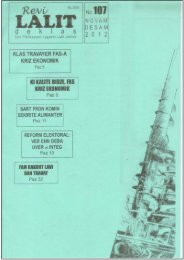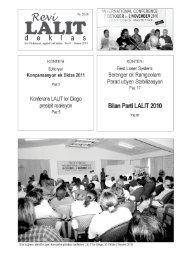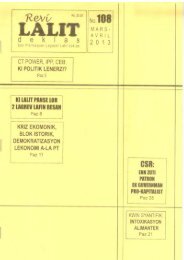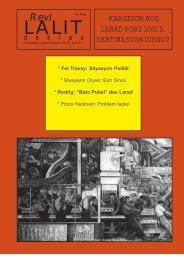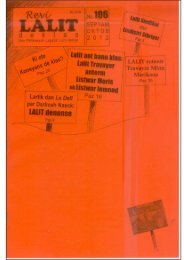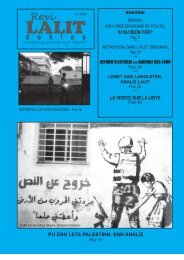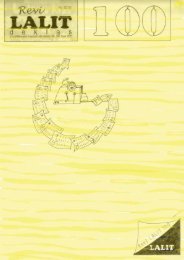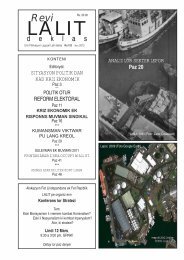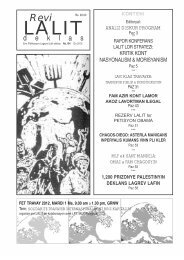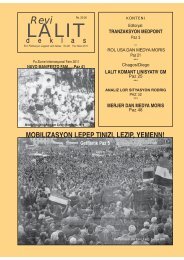Against communalism of the best-loser system - Lalit Mauritius
Against communalism of the best-loser system - Lalit Mauritius
Against communalism of the best-loser system - Lalit Mauritius
Create successful ePaper yourself
Turn your PDF publications into a flip-book with our unique Google optimized e-Paper software.
will not be considered for such allocation, should <strong>the</strong> candidates be entitled to <strong>the</strong> same. The<br />
Commission will carry out <strong>the</strong> exercise as spelt out in <strong>the</strong> First Schedule and it will be up to <strong>the</strong><br />
candidates to decide what stand <strong>the</strong>y will adopt.”<br />
But, Justice Seetulsingh has only addressed one half – <strong>the</strong> smaller half – <strong>of</strong> <strong>the</strong> problem: if we<br />
are not elected but get sufficient votes to qualify for a communal Best Loser seat. Then, our<br />
letter, he advises <strong>the</strong> Electoral Supervisory Commission, is binding. Much more important than<br />
this is ano<strong>the</strong>r issue – one which proves that <strong>the</strong> communal classification in <strong>the</strong> Best Loser<br />
<strong>system</strong> in fact infects <strong>the</strong> entire <strong>system</strong>, and that ALL members <strong>of</strong> <strong>the</strong> National Assembly are<br />
communally classified in order to name <strong>the</strong> eight Best Losers on <strong>the</strong> basis <strong>of</strong> community.<br />
After attempting to give redress for “upsetting <strong>the</strong> proper allocation <strong>of</strong> <strong>best</strong> <strong>loser</strong> seats”, <strong>the</strong><br />
Supreme Court judgment will, as we will show, risk, if used as a guideline in <strong>the</strong> future lead to<br />
even more “upsetting <strong>the</strong> proper allocation <strong>of</strong> <strong>best</strong> <strong>loser</strong> seats”, within <strong>the</strong> logic <strong>of</strong> <strong>the</strong> <strong>system</strong>,<br />
iniquitous as this logic may be. Let us explain.<br />
We go back to <strong>the</strong> earlier sentence: Imagine for a minute if all or most <strong>of</strong> <strong>the</strong> 20 <strong>Lalit</strong> and Nuvo<br />
Lizur candidates who were brought before <strong>the</strong> Supreme Court and re-classified had, in fact, been<br />
elected.<br />
All <strong>of</strong> <strong>the</strong>m are now reclassified by <strong>the</strong> Supreme Court as being members <strong>of</strong> <strong>the</strong> “G….P….”<br />
Then, once <strong>the</strong> Electoral Supervisory Commission sits down after elections to work out <strong>the</strong> <strong>best</strong><br />
<strong>loser</strong>s, this classification would be brought out along with all <strong>the</strong> o<strong>the</strong>r elected members’<br />
communal auto-classification. Because <strong>the</strong>re is a block <strong>of</strong> “G… P…” members elected (all <strong>the</strong><br />
<strong>Lalit</strong> and Nuvo Lizur candidates having been thus re-classified and subsequently elected), this<br />
means that <strong>the</strong>re will be fewer “G…. P….” <strong>best</strong> <strong>loser</strong>s for <strong>the</strong> rest <strong>of</strong> <strong>the</strong> candidates than if we<br />
had been left with “random” communities we attributed to ourselves through <strong>the</strong> drawing <strong>of</strong><br />
lots. Thus <strong>the</strong> “proper allocation” (within <strong>the</strong> awful logic <strong>of</strong> <strong>the</strong> communal <strong>best</strong> <strong>loser</strong> <strong>system</strong>)<br />
would be even more upset by <strong>the</strong> Judgment than it could possibly have been by our action <strong>of</strong><br />
drawing lots.<br />
The reason for this strange state <strong>of</strong> affairs is two-fold.<br />
First “community”, as we know it in <strong>Mauritius</strong>, is no more than a “shared set <strong>of</strong> prejudices” reinforced<br />
every time <strong>the</strong>re is a General Election. That is to say, “community” only exists as an<br />
ideological construct, except at <strong>the</strong> moment <strong>of</strong> self-classification or <strong>of</strong> classification by <strong>the</strong><br />
Supreme Court, when it becomes a kind <strong>of</strong> “bureacratic fact”.<br />
Second, <strong>the</strong> fourth community, <strong>the</strong> “G…. P….” is both a “residual community” and also, at <strong>the</strong><br />
same time, entitled to <strong>best</strong> <strong>loser</strong> representatives “properly allocated”. This implies two opposite<br />
types <strong>of</strong> nature: first, that <strong>the</strong> G…. P…. is “all <strong>the</strong> rest” meaning almost <strong>the</strong> opposite <strong>of</strong> “a<br />
community”, and also that any one Member <strong>of</strong> <strong>the</strong> National Assembly who is a “member <strong>of</strong> <strong>the</strong><br />
“G…. P….” can represent x number <strong>of</strong> people <strong>of</strong> <strong>the</strong> “G… P….” (as a proportion from <strong>the</strong> 1972<br />
Census) as if <strong>the</strong> “G…. P….” was a homogenous community, once calculations are done under<br />
<strong>the</strong> procedures <strong>of</strong> <strong>the</strong> First Schedule.<br />
These two representations in set <strong>the</strong>ory models would be as follows:<br />
4 Communities for definition <strong>of</strong> “community”. 4 Communities for allocation <strong>of</strong> seats<br />
Here is <strong>the</strong> difficulty that arises from this major flaw in <strong>the</strong> <strong>system</strong>: <strong>Lalit</strong> and Nouvo Lizour<br />
have no undertaking not to take up ELECTED seats. On <strong>the</strong> contrary, we will obviously accept<br />
<strong>the</strong>m. That is why we stand for election: in order to be elected. But <strong>the</strong>se elected Members <strong>of</strong><br />
<strong>the</strong> National Assembly <strong>of</strong> <strong>Lalit</strong> and Nouvo Lizour are also classified communally for <strong>the</strong><br />
exercise <strong>of</strong> <strong>the</strong> <strong>best</strong> <strong>loser</strong> allocation for eight o<strong>the</strong>r candidates.<br />
Note, that, as if to make this point clear to everyone, <strong>the</strong> Constitution demands that ALL<br />
candidates, including independent candidates, declare a “community” on <strong>the</strong>ir Nomination<br />
Papers, even though independents do not <strong>the</strong>mselves qualify to be nominated Best Losers. This<br />
is because if one or more independents were actually elected (i.e. not just potential <strong>best</strong> <strong>loser</strong>s)<br />
<strong>the</strong>y would be included in <strong>the</strong> calculations on which <strong>the</strong> eight <strong>best</strong> <strong>loser</strong>s are done.



